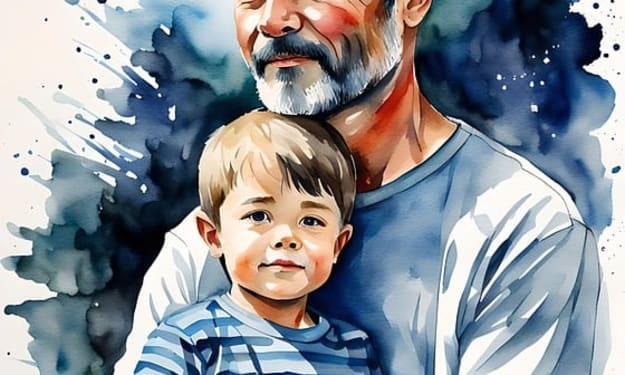The Silent Departure: Understanding the Burdens Men Carry.
Unveiling the Unspoken Struggles and Societal Pressures of Men

The phrase "Men leave the world silently one day, pulling the burden of the world like this" poignantly encapsulates the quiet struggle that many men face throughout their lives. It speaks to the often unspoken and unseen hardships that men endure, the societal expectations that weigh heavily on their shoulders, and the silent acceptance of their roles. This essay delves into the complexities of these themes, exploring the nature of these burdens, the societal constructs that shape them, and the quiet exit that so many men ultimately make.
The Silent Struggles of Men
Men have historically been expected to fulfill certain roles within society. These roles often involve being providers, protectors, and leaders. From a young age, boys are conditioned to adopt traits that align with these roles—strength, stoicism, and resilience. While these characteristics can be beneficial, they also come with significant challenges.
Societal Expectations
Society places immense pressure on men to conform to traditional masculine ideals. These expectations can be seen in various aspects of life, from career choices to family responsibilities. Men are often expected to be the primary breadwinners, a role that can lead to significant stress and anxiety, especially in uncertain economic times. The pressure to succeed professionally can overshadow personal well-being and lead to a sense of inadequacy when these expectations are not met.
Emotional Suppression
One of the most profound burdens men carry is the suppression of emotions. The cultural norm of stoicism teaches men to hide their feelings and vulnerabilities. Phrases like "boys don't cry" reinforce the idea that expressing emotions is a sign of weakness. This suppression can have serious consequences, including mental health issues such as depression and anxiety. Men may feel isolated, unable to seek help or share their struggles, further deepening their silent suffering.
The Role of Provider
The expectation to provide for one's family is deeply ingrained in many cultures. This responsibility can be a source of pride but also a significant burden. Economic instability, job insecurity, and the rising cost of living can make it difficult for men to meet these expectations. The fear of failure and the stigma associated with not being able to provide adequately can lead to feelings of worthlessness and despair.
The Nature of Burdens
The burdens men carry are multifaceted, encompassing emotional, psychological, and physical aspects. These burdens can manifest in various ways, affecting their health, relationships, and overall quality of life.
Psychological Burdens
Psychological burdens often stem from the pressures of meeting societal expectations. The constant need to prove oneself can lead to chronic stress and burnout. Men may feel trapped in a cycle of striving for success, never feeling satisfied with their achievements. This perpetual striving can prevent them from finding true fulfillment and happiness.
Emotional Burdens
Emotional burdens are often the result of suppressed feelings and unaddressed traumas. Men may carry unresolved issues from their past, such as childhood experiences, relationship problems, or personal failures. Without a healthy outlet for these emotions, they can accumulate and lead to severe mental health issues. The inability to express vulnerability can also hinder the development of deep, meaningful relationships.
Physical Burdens
Physical burdens can arise from the demanding nature of certain jobs or the stress associated with fulfilling societal roles. Men may work long hours in physically demanding professions, putting their bodies under significant strain. The toll of physical labor, combined with the stress of providing and protecting, can lead to health problems such as cardiovascular disease, chronic pain, and a weakened immune system.
The Silent Acceptance
Despite the heavy burdens they carry, many men accept their roles silently. This acceptance is often driven by a sense of duty and responsibility. Men may feel that it is their obligation to bear these burdens without complaint, believing that their worth is tied to their ability to endure and persevere.
Cultural Conditioning
Cultural conditioning plays a significant role in shaping men’s acceptance of their burdens. Traditional gender roles and societal norms reinforce the idea that men must be strong and self-reliant. This conditioning can make it difficult for men to seek help or admit when they are struggling. The fear of being perceived as weak or inadequate can prevent them from addressing their issues openly.
The Fear of Vulnerability
The fear of vulnerability is another factor that contributes to the silent acceptance of burdens. Men may worry that expressing their struggles will lead to judgment or rejection. This fear can be particularly pronounced in professional settings, where showing vulnerability may be seen as a sign of incompetence. As a result, men often choose to suffer in silence rather than risk their reputation or relationships.
The Impact of Silence
The silent acceptance of burdens can have profound consequences for men’s well-being. The lack of emotional expression and support can lead to a sense of isolation and loneliness. Over time, this isolation can erode mental and physical health, leading to a range of issues from depression and anxiety to chronic illness. The cumulative effect of these burdens can ultimately shorten men’s lives, contributing to the phrase "men leave the world silently."
The Quiet Exit
The concept of a quiet exit refers to the manner in which many men pass away, often without having addressed the burdens they carried throughout their lives. This silent departure can be seen as the final act of enduring societal expectations, leaving behind a legacy of unspoken struggles and unresolved issues.
The Stigma of Seeking Help
One of the reasons for this quiet exit is the stigma associated with seeking help. Men are less likely than women to seek mental health support or talk about their problems. This reluctance is partly due to the perception that seeking help is a sign of weakness. The fear of being judged or misunderstood can prevent men from reaching out, even when they are in desperate need of support.
The Impact on Loved Ones
The silent departure of men can have a profound impact on their loved ones. Family members may be unaware of the extent of their struggles, leading to feelings of guilt and regret after their passing. The lack of communication about their burdens can also perpetuate a cycle of silence, where future generations continue to suppress their emotions and endure their struggles alone.
Breaking the Silence
To address the issue of men leaving the world silently, it is essential to break the cycle of silence and encourage open communication. This involves challenging traditional gender roles and societal expectations, promoting emotional expression, and creating supportive environments where men feel comfortable seeking help.
Redefining Masculinity
Redefining masculinity is a crucial step in alleviating the burdens men carry. This involves moving away from rigid gender roles and embracing a more inclusive and flexible understanding of what it means to be a man.
Embracing Emotional Expression
Encouraging men to express their emotions is essential for their mental and emotional well-being. This can be achieved through education, raising awareness about the importance of mental health, and providing safe spaces for men to share their feelings. By normalizing emotional expression, society can help men feel more comfortable seeking support and addressing their struggles openly.
Promoting Mental Health
Promoting mental health involves challenging the stigma associated with seeking help and providing accessible resources for men. This includes offering mental health services tailored to men’s needs, creating support groups, and raising awareness about the benefits of therapy and counseling. By making mental health support more accessible and acceptable, society can help men address their burdens before they become overwhelming.
Encouraging Healthy Relationships
Healthy relationships play a vital role in men’s well-being. Encouraging men to build strong, supportive relationships can provide them with the emotional support they need to navigate life’s challenges. This involves promoting open communication, empathy, and mutual respect in relationships, and challenging the notion that men must be stoic and self-reliant.
The Role of Society
Society plays a significant role in shaping the experiences and expectations of men. By addressing societal norms and promoting a more inclusive and supportive culture, society can help alleviate the burdens men carry.
Challenging Gender Roles
Challenging traditional gender roles involves questioning the expectations placed on men and promoting a more flexible understanding of masculinity. This can be achieved through education, media representation, and public discourse. By challenging the notion that men must fulfill specific roles, society can create a more inclusive environment where men feel free to express their true selves.
Providing Supportive Environments
Creating supportive environments involves providing resources and opportunities for men to seek help and address their burdens. This includes offering mental health services, creating support groups, and promoting workplace policies that support work-life balance. By providing men with the tools and support they need, society can help them navigate their challenges more effectively.
Fostering Open Communication
Fostering open communication involves encouraging men to talk about their struggles and seek support when needed. This can be achieved through public awareness campaigns, education, and community initiatives. By promoting a culture of openness and empathy, society can help men feel more comfortable addressing their burdens and seeking help.
Conclusion
The phrase "Men leave the world silently one day, pulling the burden of the world like this" highlights the quiet struggles that many men face throughout their lives. These burdens, shaped by societal expectations and cultural norms, often go unspoken and unaddressed, leading to significant consequences for men’s well-being. To address these issues, it is essential to challenge traditional gender roles, promote emotional expression, and create supportive environments where men feel comfortable seeking help. By redefining masculinity and fostering a culture of openness and empathy, society can help men navigate their burdens more effectively and prevent them from leaving the world silently.
About the Creator
Enjoyed the story? Support the Creator.
Subscribe for free to receive all their stories in your feed. You could also pledge your support or give them a one-off tip, letting them know you appreciate their work.





Comments
There are no comments for this story
Be the first to respond and start the conversation.